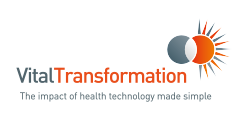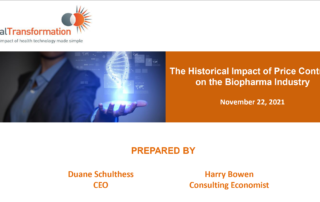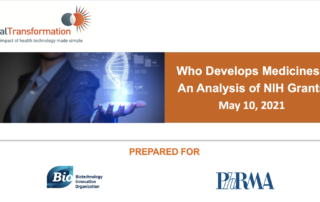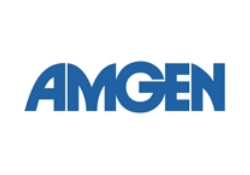Vital Transformation understands the implications of new medical procedures, technologies and policies. We measure their impact on current clinical practices in close collaboration with health care professionals, researchers, and regulators. Through our web platform and client network, we are able to communicate our findings with international decision makers and stakeholders. Vital Transformation has presented or participated in conferences sponsored by The Royal College of Physicians, European Health Forum Gastein, The European Commission, London Genetics, The European Science Foundation, The European Microelectronics Summit, and others. Our Vital Transformation branded round-tables, webinars, and conferences are often oversubscribed, and are regularly presented in partnership with global thought-leaders and organisations.
OUR RESEARCH
Why is the Plasma Industry Different than Biopharma?
• Unprecedented cost increases – in an industry that already experienced serious patient access challenges in 2019, pre-US border policy and pre-COVID-19 – have put manufacturers under considerable strain worldwide.
• As a majority global plasma donations come from the United States, poorly considered, one-size-fits all reimbursement decisions will substantially increase the risk of patient access concerns and negatively impact the sector globally.
• The plasma industry is subject to many of the same pressures of other industries. As ingredient costs rise and reimbursement falls there must be a point where the viability of that industry is in jeopardy.
The Historical Impact of Price Controls on the Biopharma Industry
With US congressional proposals now advocating in favor of government price setting for prescription medicines, the impacts of historical price setting in Europe provides a robust data source to test and predict the impact of price controls in the US on the biopharma ecosystem.
• This study uses statistical and economic modeling to calculate the net impact of EU price controls upon the domestic biopharma ecosystem in Europe; US and EU prices were compared for the top 10 selling drugs in the US for each year from 2003 – 2020*, and impacts upon biopharma R&D ecosystem key performance indicators (KPIs) were measured.
• Our research shows that every 10% drop in the price of medicines in price-controlled EU markets was associated with a:
-> 14% decrease in total VC funding (10% early stage and 17% late stage)
-> 7% decrease in biotech patents,
-> 9% decrease in biotech start-up funding relative to the US
-> an 8% increase in the delay of access to medicines.
• Our model also proved robust at predicting the trend impacts of drug pricing on Japanese biopharma KPIs, which acts as a validation of our methodology; we posit that similar drops measured by biopharma KPIs in the US would be seen over time with similar price controls.
• Drug pricing controls implemented in the US would likely have an even greater impact on biopharma KPIs given its global leadership in investment and innovation.
Who Develops Medicines? An Analysis of NIH Grants
There is a misguided perception that NIH funding, not private market investment, is largely responsible for the creation and approval of new therapies. This study tests that hypothesis by identifying patents linked to NIH grants from a single year, identifying those associated with clinical trials and approved medicines, and quantifying the public and private investments made for those investigational and approved medicines. Key findings include: 23,230 NIH grants in the year 2000 were linked – by NIH-supported patents – to 18 FDA-approved medicines by 2020. None of these medicines reached approval without significant private investment. In fact, total private investment for the 18 approved medicines exceeded NIH funding by orders of magnitude: $44.2 billion in private investment compared to $670 million in NIH funding. As industry’s share of total investment increased, so did the likelihood of approval. These findings are consistent with the substantial literature describing the complementary roles of public and private R&D funding, and the significant long-term investments shouldered by industry with no guarantee of approval – in fact just 12% of medicines in clinical development are ultimately approved by the FDA. Public policies that would seek to replace private sector investment with publicly-funded drug development or that would reduce industry’s ability to build upon publicly-funded discoveries to bring medicines to market are therefore likely to slow drug development.
PODCASTS
NEWSLETTER
Register now to receive all the latest updates from Vital Transformation including our research, podcasts and more…
Our clients include many of the world’s leading health care organisations.




























